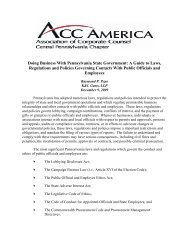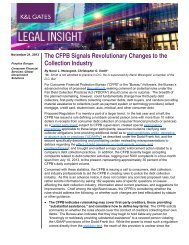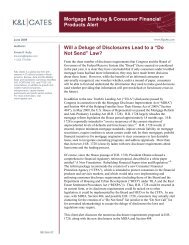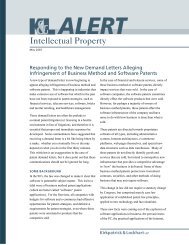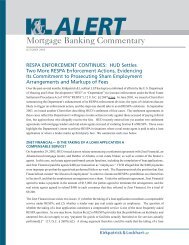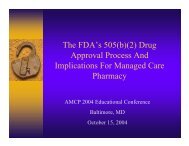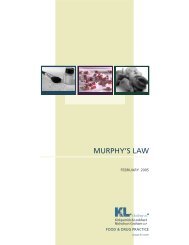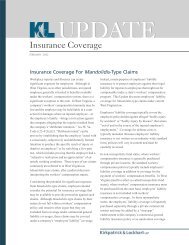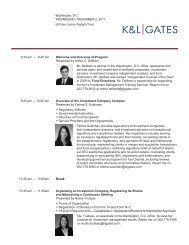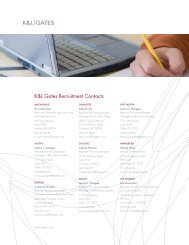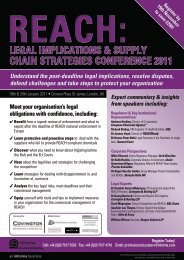Legal ethics of coaching witnesses: how far can you go?
Legal ethics of coaching witnesses: how far can you go?
Legal ethics of coaching witnesses: how far can you go?
You also want an ePaper? Increase the reach of your titles
YUMPU automatically turns print PDFs into web optimized ePapers that Google loves.
Massachusetts Lawyers Weekly : Archives Page 3 <strong>of</strong> 5<br />
In addition to this rule, on Feb . 22, in a pretrial order, the trial judge explicitly barred all but two <strong>of</strong><br />
the prosecution's <strong>witnesses</strong> from being present in the courtroom prior to their own scheduled<br />
testimony and barred all but these two <strong>witnesses</strong> from reviewing transcripts <strong>of</strong> other <strong>witnesses</strong> .<br />
Martin is not only alleged to have violated Rule 615 and the judge's specific order, but she left an<br />
e-mail trail <strong>of</strong> her breach . In these e-mails, Martin informed the <strong>witnesses</strong> <strong>of</strong> her opinion that the<br />
prosecutors, in their opening statements, had left "big gaps in the case ." She advised <strong>witnesses</strong><br />
that they had their work cut out for them, that they had to get around certain problems with the<br />
evidence, and that "we MUST emphasize the deterrent value <strong>of</strong> the measures ."<br />
One <strong>of</strong> the <strong>witnesses</strong> informed the prosecutors <strong>of</strong> the e-mails and the <strong>go</strong>vernment subsequently<br />
came forward and reported her alleged misconduct . After a hearing, the judge, who described<br />
Martin's conduct as "egregious," barred these particular <strong>witnesses</strong> from testifying in this case .<br />
According to published sources, she presently is under investigation by both the U .S. Attorney's<br />
Office and a lawyer disciplinary board in Pennsylvania, where she is a member <strong>of</strong> the bar .3<br />
Such blatant misconduct, while very unusual, is not unheard <strong>of</strong> . In Matter <strong>of</strong> Foley, 439 Mass .<br />
324 (2003), the respondent lawyer admitted to assisting a client4 in concocting a false story<br />
intended to raise a defense in a gun-carrying case . Even though the false testimony never was<br />
presented in court, it was communicated to the assistant district attorney in the case prior to<br />
being abandoned by the lawyer.<br />
In Foley, the lawyer not only did not discourage his client about testifying falsely and expressed<br />
no reservations about his doing so, but planted the seeds for the fabricated defense with the<br />
prosecutor and, over a two-week period, proceeded to manufacture a scenario to explain the<br />
false testimony .<br />
Even though he subsequently abandoned this ill-conceived plan, the court considered his<br />
misconduct to be "serious and deliberate ." Foley was suspended for three years for his<br />
misconduct, which the court described as an affirmative fabrication <strong>of</strong> a defense and the<br />
solicitation <strong>of</strong> false testimony to support it .<br />
There are two other cases <strong>of</strong> note in Massachusetts where the lawyers clearly crossed the lines<br />
drawn in the Rules <strong>of</strong> Pr<strong>of</strong>essional Conduct .<br />
In Matter <strong>of</strong> Gross, 435 Mass. 445 (2001), the court suspended a lawyer for 18 months for<br />
soliciting a client and alibi witness to engage in an impersonation scheme before a court, and in<br />
Matter <strong>of</strong> McCarthy, 416 Mass. 423 (1993), the court imposed a one-year suspension for a<br />
lawyer who elicited false testimony and presented false documents in an administrative<br />
proceeding .<br />
Proceed with caution<br />
There are a few particular areas in which lawyers should be especially careful .<br />
First, although a lawyer is prohibited from counseling or assisting in conduct he knows is<br />
criminal or fraudulent, he still may discuss the consequences <strong>of</strong> any proposed course <strong>of</strong> conduct<br />
with a client and may counsel or assist a client to make a <strong>go</strong>od-faith effort to determine the<br />
validity, scope, meaning or application <strong>of</strong> the law. (Rule 1 .2(d) )<br />
As Comment [6] notes, <strong>how</strong>ever, "there is a critical distinction between presenting an analysis <strong>of</strong><br />
legal aspects <strong>of</strong> questionable conduct and recommending the means by which a crime or fraud<br />
might be committed with impunity ."<br />
I always advise my lawyer clients to make clear to their clients that they <strong>can</strong>not advise them<br />
regarding any future or proposed criminal conduct, and, to <strong>go</strong> one step further, tell them they<br />
should not commit the proposed criminal or fraudulent conduct .<br />
http://www. masslaw. corn/subscriberlarchives_FT S. cfm?page=ma106192 50622 .htm&recID . . . 3/30/2007



